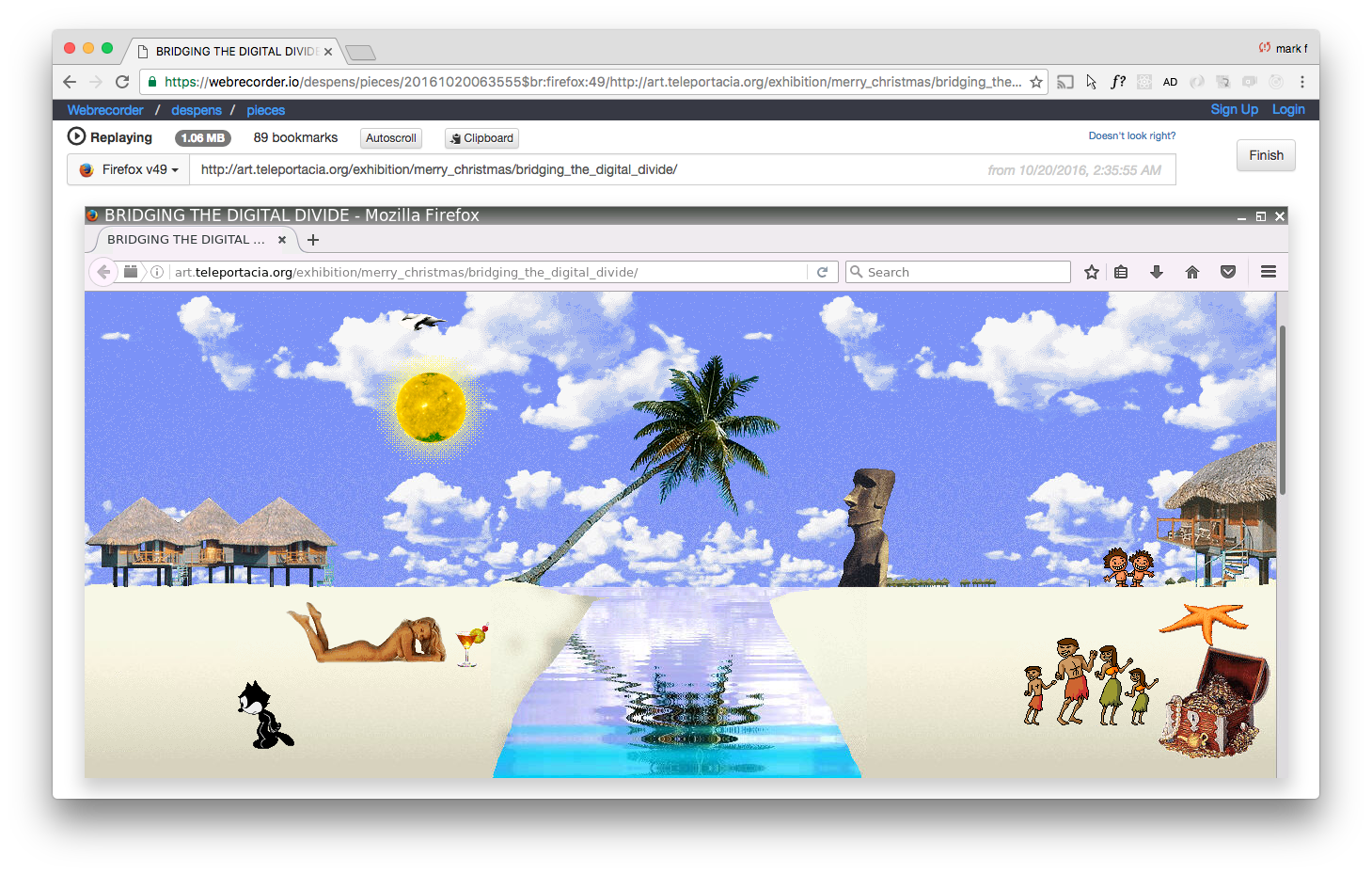This week, Rhizome launches Net Art Anthology, a new program narrating the history of net art through the restoration and re-staging of 100 essential artworks. Webrecorder—our groundbreaking tool for dynamic web archiving, which saw a public release in August—will be essential to this endeavor.
Today, on the eve of this launch, the Webrecorder team—directed by Ilya Kreymer, lead developer—rolls out a significant update, one that radically expands the tool's utility. As ever, this functionality is free for all users; sign up for your account here.
Remote Browsers: archive and replay the web through emulated browsers

As of today, Webrecorder allows users to record and replay using a remote browser running in a fixed environment. Through a drop-down menu on the recording bar, one can now choose a remote browser environment optimally configured for specific recording and replay urgencies.
This work builds on remote browsing technology first introduced with the release of http://oldweb.today last year. With oldweb.today, anyone could browse old websites using old browsers running on remote machines. With this release, we've integrated this technology into Webrecorder to allow users to record and replay modern websites with the modern browsers, all still running on remote machines in fixed environments.
The newly available browsers are:
- Chrome 53 for Linux, with Flash Support
- Firefox 49 for Linux, with Java and Flash Support
What does this mean? No Flash, no Java, no problem!

Screenshot of Webrecorder archive of Dragan Espenschied, Bridging the Digital Divide (2003). Website with Java Applet.
Many great sites were created with Flash and Java, and yet they are increasingly deprecated and few browsers still support what were once pillars of the web. With Webrecorder's remote browsers, one can now easily archive and replay websites created with these two tools, regardless of one's current system browser. Dragan Espenschied's Bridging The Digital Divide (2003) is a great example of a work which does not perform on the current Chrome browser, but is fully accessible once again through recording and replay on Firefox 49, with Java support.
Replay with Different Browsers
Recording on Chrome 53, but want to view on Firefox 49? Webrecorder will meet your need. On the collection page, users can now see which browser was used to record a particular bookmark, and view the page with the same browser or choose another of the available ones.
Recording Tools, Clipboard Support
![]()
We've also made a few updates to existing Webrecorder tools such as the “autoscroll” button. These too will work with remote browsers.
- The “autoscroll” button will begin auto-scrolling a remote page, similar to its functionality in native recording mode.
- The “snapshot” tool will take a static HTML snapshot of the current page as it is with all dynamic elements removed.
- The new “clipboard” tool allows users to seamlessly copy text from the remote browser. Selecting text in the remote browser and clicking “clipboard” will allow users to access to the remote browser’s clipboard. Text entered into this field will update the remote browser clipboard, allowing users to copy and paste (Ctrl+C, Ctrl+V) directly into the remote browser.
Higher Fidelity, Faster Recording
The most important aspect of this update is that, overall, it makes Webrecorder a more powerful tool for archiving the dynamic web. Using remote browsers allows even higher fidelity than ever before, as the page need not pass through a client side rewriting system. Page loading times should also be faster as the page is loaded directly on a remote server and streamed to the user.
Top image: Dragan Espenschied, detail of Bridging the Digital Divide (2003). Website with Java Applet.
Major support for the Webrecorder project is provided by The Andrew W Mellon Foundation.



